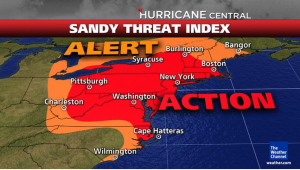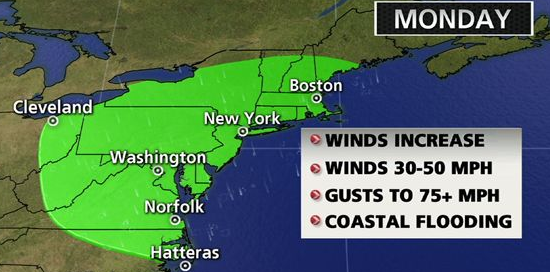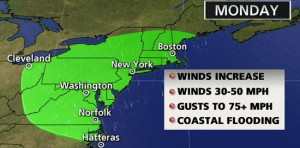The Sachem Report will provide information for the Sachem community throughout the duration of what the Weather Channel is calling a “megastorm.”
Using terms like epic, most media outlets have been painting a dark picture as Hurricane Sandy approaches. While the wind has already begun on Long Island, the Weather Channel is calling for the bulk of the storm’s dangerous features to hit Monday around 9 p.m.
RELATED: American Red Cross Hurricane Safety Check List
UPDATED: Sachem Schools storm information: Sachem has officially closed school on Monday and Tuesday due to the storm. READ MORE. Please follow @SachemSchools on Twitter and Facebook.com/SachemSchools for breaking information regarding the school district.
Sachem East / Red Cross: Sachem High School East in Farmingville, N.Y. will serve as an emergency shelter for the American Red Cross during the storm.
 LIRR service updates: According to the Long Island Rail Road, starting at 7 p.m. Sunday, service on the LIRR will be suspended system-wide in advance of Hurricane Sandy making landfall for the safety of our customers, employees and to protect our equipment. Customers are urged not to wait for the last trains when making their travel plans.
LIRR service updates: According to the Long Island Rail Road, starting at 7 p.m. Sunday, service on the LIRR will be suspended system-wide in advance of Hurricane Sandy making landfall for the safety of our customers, employees and to protect our equipment. Customers are urged not to wait for the last trains when making their travel plans.
AMERICAN RED CROSS HURRICANE PREPAREDNESS GUIDE
A hurricane is on its way. What do I do?
- Listen to a NOAA Weather Radio for critical information from the National Weather Service (NWS).
- Check your disaster supplies. Replace or restock as needed.
- Bring in anything that can be picked up by the wind (bicycles, lawn furniture).
- Close your windows, doors and hurricane shutters. If you do not have hurricane shutters, close and board up all windows and doors with plywood.
- Turn your refrigerator and freezer to the coldest setting. Keep them closed as much as possible so that food will last longer if the power goes out.
- Turn off propane tank.
- Unplug small appliances.
- Fill your car’s gas tank.
- Create an evacuation plan with members of your household. Planning and practicing your evacuation plan minimizes confusion and fear during the event.
- Find out about your community’s hurricane response plan. Plan routes to local shelters, register family members with special medical needs and make plans for your pets to be cared for.
- Obey evacuation orders. Avoid flooded roads and washed out bridges.
Standard homeowners insurance doesn’t cover flooding. It’s important to have protection from the floods associated with hurricanes, tropical storms, heavy rains and other conditions that impact the U.S. For more information on flood insurance, please visit the National Flood Insurance Program Web site at www.FloodSmart.gov.
What supplies do I need?
- Water—at least a 3-day supply; one gallon per person per day
- Food—at least a 3-day supply of non-perishable, easy-to-prepare food
- Flashlight
- Battery-powered or hand-crank radio (NOAA Weather Radio, if possible)
- Extra batteries
- First aid kit
- Medications (7-day supply) and medical items (hearing aids with extra batteries, glasses, contact lenses, syringes, etc.)
- Multi-purpose tool
- Sanitation and personal hygiene items
- Copies of personal documents (medication list and pertinent medical information, proof of address, deed/lease to home, passports, birth certificates, insurance policies)
- Cell phone with chargers
- Family and emergency contact information
- Extra cash
- Emergency blanket
- Map(s) of the area
- Baby supplies (bottles, formula, baby food, diapers)
- Pet supplies (collar, leash, ID, food, carrier, bowl)
- Tools/supplies for securing your home
- Extra set of car keys and house keys
- Extra clothing, hat and sturdy shoes
- Rain gear
- Insect repellent and sunscreen
- Camera for photos of damage
What do I do after a hurricane?
- Continue listening to a NOAA Weather Radio or the local news for the latest updates.
- Stay alert for extended rainfall and subsequent flooding even after the hurricane or tropical storm has ended.
- If you evacuated, return home only when officials say it is safe.
- Drive only if necessary and avoid flooded roads and washed out bridges.
- Keep away from loose or dangling power lines and report them immediately to the power company.
- Stay out of any building that has water around it.
- Inspect your home for damage. Take pictures of damage, both of the building and its contents, for insurance purposes.
- Use flashlights in the dark. Do NOT use candles.
- Avoid drinking or preparing food with tap water until you are sure it’s not contaminated.
- Check refrigerated food for spoilage. If in doubt, throw it out.
- Wear protective clothing and be cautious when cleaning up to avoid injury.
- Watch animals closely and keep them under your direct control.
- Use the telephone only for emergency calls.
Helpful links
-Words by Chris R. Vaccaro

